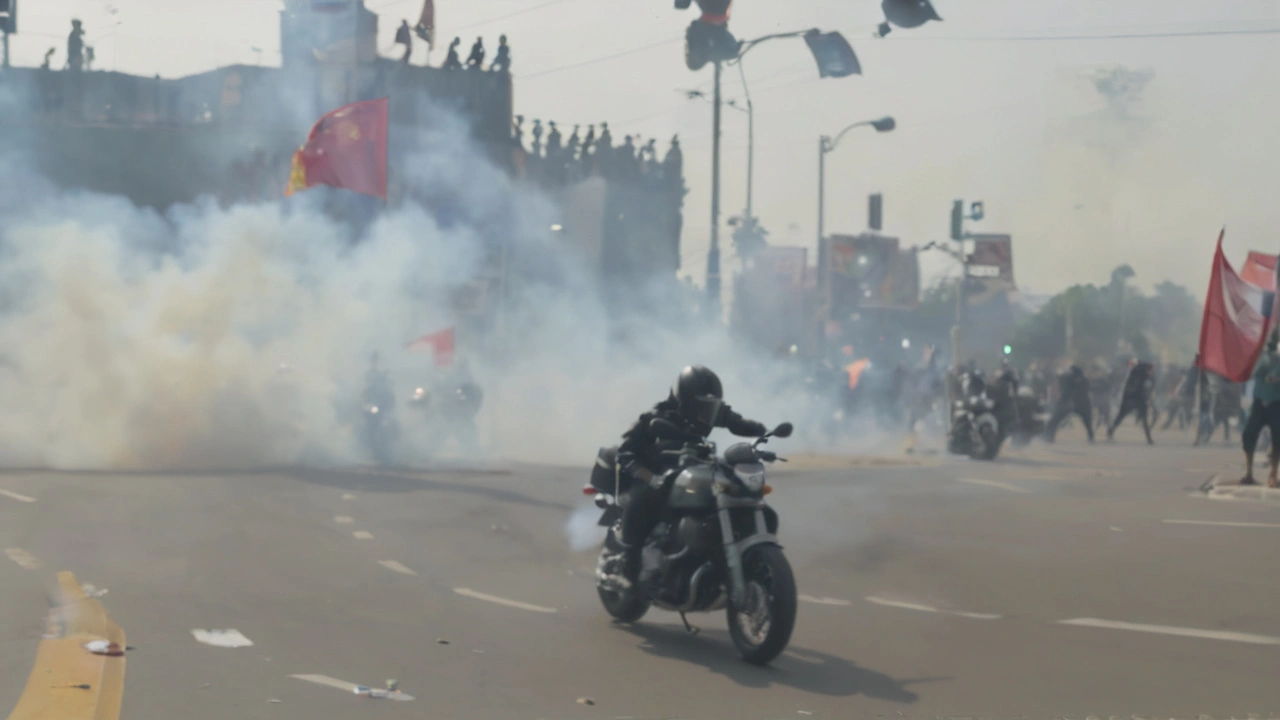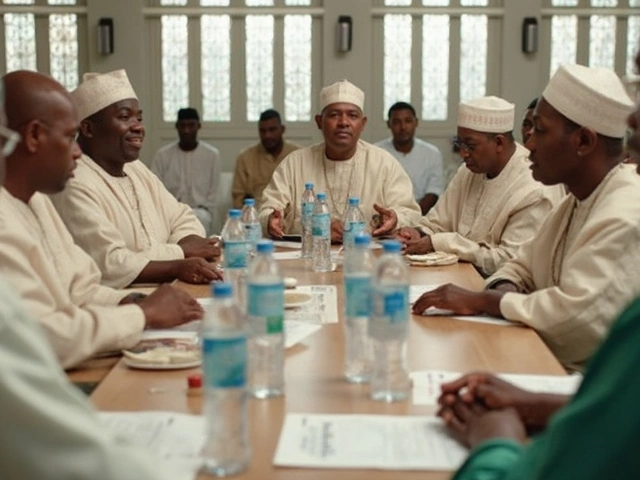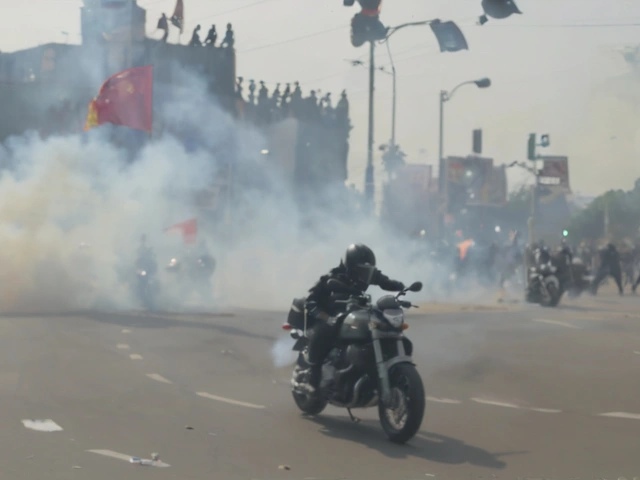Nigerian States Enforce 24-Hour Curfews in Response to Protests Over Rising Living Costs
As protests continue to surge across Nigeria over the soaring cost of living, four states have taken stringent measures to restore order by imposing 24-hour curfews. This decision comes amidst escalating unrest that has significantly disrupted daily activities and poses a growing threat to public safety. The move has underscored the government's recognition of the severe discontent among the populace and their determination to curb any further escalation.
Backdrop of the Unrest
The recent wave of protests in Nigeria is a reflection of mounting frustrations among citizens who are grappling with economic hardships. Spiraling inflation, coupled with unemployment and systemic inequalities, has pushed many Nigerians to the brink. The cost of essential goods and services has seen an unprecedented rise, leaving a significant portion of the population struggling to make ends meet. This economic distress has fueled widespread anger and resentment, manifesting in the form of large-scale protests.
The protests have been marked by a series of public demonstrations, with people taking to the streets in large numbers. In some cases, these gatherings have turned violent, resulting in clashes between protesters and security forces. The situation has been further exacerbated by reports of looting and vandalism, adding to the chaos and prompting a strong response from state authorities.
States Imposing Curfews
In response to the escalating situation, the governments of four Nigerian states have imposed around-the-clock curfews. The primary objective of these curfews is to deter gatherings and prevent any further unrest. By restricting movement, state authorities hope to restore a sense of normalcy and protect lives and property. The curfews are being enforced by a heavy presence of security personnel, including police and military forces, who have been deployed to maintain order.
While the exact names of the states enforcing the curfews have not been disclosed, the measures have drawn mixed reactions from the public. Some citizens view the curfews as a necessary step to ensure safety and prevent further violence. Others, however, see them as an infringement on their freedom and a tactic to suppress legitimate grievances. The imposition of curfews has also raised concerns about the impact on daily livelihoods, particularly for those who rely on daily wages and operate in the informal sector.
Casualties and Humanitarian Impact
The protests have unfortunately resulted in significant casualties. According to Amnesty International, at least 13 individuals have lost their lives in the ongoing unrest. These deaths have sparked outrage and further galvanized the protest movement. Reports indicate that many of the deceased were civilians who were caught in the crossfire between protesters and security forces. Additionally, numerous injuries have been reported, with medical facilities struggling to cope with the influx of patients.
Beyond the immediate physical toll, the protests have also had a profound psychological and emotional impact on the population. Fear and uncertainty are pervasive, with many citizens anxious about their safety and future. The economic repercussions of the unrest are also becoming apparent, as businesses face disruptions and the overall market experiences instability. The combined effect of these factors is contributing to an increasingly volatile environment, requiring urgent and effective intervention from the government.
Efforts to Stabilize the Situation
In addition to enforcing curfews, state governments are exploring various strategies to stabilize the situation and address the root causes of the unrest. Dialogue and engagement with protest leaders and civil society organizations have been identified as critical steps in finding a resolution. State authorities are keen to open channels of communication and address the underlying grievances that have driven people to the streets.
Another important focus is on alleviating the economic pressures faced by citizens. This includes exploring measures to control inflation, create job opportunities, and provide social safety nets for the most vulnerable segments of the population. Programs aimed at supporting small and medium-sized enterprises (SMEs) and promoting entrepreneurship are also being considered as part of a broader strategy to boost economic resilience.
Furthermore, efforts are being made to improve the transparency and accountability of governance. Initiatives to curb corruption and enhance institutional efficiency are seen as vital to restoring public trust and confidence in the government. By addressing structural issues and ensuring that resources are allocated fairly and effectively, the authorities hope to create a more stable and equitable society.
Community and International Responses
The unrest in Nigeria has garnered significant attention both domestically and internationally. Within the country, community leaders and influential figures are playing a crucial role in advocating for peace and urging restraint among protesters. Religious organizations, non-governmental organizations (NGOs), and other civil society groups are actively involved in mediation efforts, providing platforms for dialogue and negotiation.
Internationally, several governments and organizations have expressed concern over the developments in Nigeria. Calls for calm and restraint have been issued, alongside offers of support and assistance in addressing the crisis. Human rights organizations are closely monitoring the situation and advocating for the protection of citizens' rights during this turbulent period. The international community is keen to see a peaceful resolution and is encouraging Nigerian authorities to adopt inclusive and transparent approaches in their efforts to restore stability.
The Road Ahead
As the situation in Nigeria continues to unfold, it is clear that the path to resolution will require a multifaceted approach. Addressing the immediate security concerns through curfews and law enforcement is a necessary step, but it must be coupled with efforts to tackle the underlying economic and social challenges. The government's ability to effectively respond to the needs and grievances of its citizens will be a determining factor in restoring peace and stability.
The protests have highlighted the urgent need for systemic reforms and greater attention to the welfare of the population. Ensuring that governance is responsive and inclusive will be critical to rebuilding trust and fostering a sense of shared purpose. As Nigeria navigates this challenging period, the resilience and determination of its people will be key to overcoming the current crisis and forging a more just and prosperous future.
Tristan





Comments
The curfew circus is a flamboyant distraction from the real hunger pangs gnawing the streets.
While the government's knee‑jerk curfew appears as a veneer of order, it merely masks the deeper malaise fermenting beneath the city’s cracked pavement.
One could argue that restricting movement without addressing the soaring cost of staples is akin to putting a bandage on a festering wound.
History teaches us that oppression masquerading as protection inevitably sows seeds of further dissent.
The protesters, driven by a gnawing hunger for basic necessities, are not merely agitators but custodians of a dying social contract.
If the state continues to prioritize a façade of security over tangible economic relief, the illusion of stability will crumble faster than the last loaf of bread on a starving market stall.
Moreover, the silence of international actors, while diplomatically polite, echoes louder than any militarized patrol on the streets.
Their tepid statements fail to confront the structural corruption that inflates prices and throttles opportunity.
Consider the informal sector workers whose daily earnings vanish under the weight of curfew fines and confiscated merchandise.
Their voices, muffled by curfew sirens, deserve more than tokenistic dialogue.
A genuine solution must intertwine monetary policy with grassroots empowerment, lest the state gamble with lives like chips in a reckless game.
Investing in transparent subsidy mechanisms could alleviate the immediate pain without triggering the inflationary spiral.
Simultaneously, anti‑corruption reforms would restore public trust, a currency far more valuable than any fiat.
Dialogue, however, cannot be a one‑way monologue delivered from government balconies; it must be a polyphonic chorus where protesters’ grievances shape policy.
Only through such inclusive deliberation can the nation hope to transform unrest into constructive civic engagement.
In sum, curfews are a temporary bandage; lasting healing demands systemic overhaul and compassionate governance.
The pretentious pomp of a 24‑hour curfew smacks of elitist denial, as if the elite can simply lock doors while the masses starve outside.
Such heavy‑handed tactics betray a lack of faith in genuine dialogue, preferring sirens over solutions.
Meanwhile, everyday Nigerians scramble for whatever crumbs slip through the enforced night, their livelihoods throttled by arbitrary bans.
This isn’t security; it’s suppression dressed in a uniform of lawfulness, a thin veil that barely conceals desperation.
Ah, the drama! The night sky now echoing with the roar of armored trucks while families huddle in darkness, dreaming of brighter mornings.
Such theatrics only deepen the wound, turning hope into a mournful aria of helplessness.
We must not let this tragedy become a bleak tableau; the human spirit demands a louder chorus.
One practical step could be setting up community food hubs that operate under special curfew exemptions, ensuring vulnerable households receive essential supplies.
Additionally, transparent communication from local authorities about any changes to curfew rules can reduce confusion and panic.
Targeted cash‑transfer programs for informal workers would also mitigate the economic shock while longer‑term reforms take shape.
Collaboration between NGOs, religious groups, and government agencies can streamline aid distribution and build trust.
These measures, grounded in empathy and pragmatism, could ease the immediate strain while broader policies address inflation and unemployment.